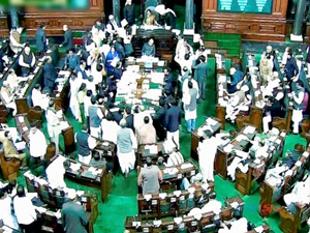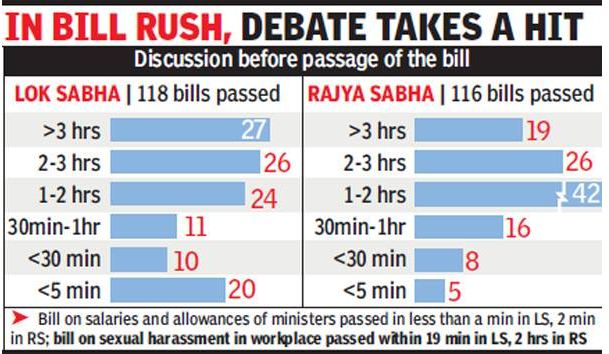This Lok Sabha cleared 17% of bills in less than five minutes,Telangana bill,Rajya Sabha,Lok Sabha,Communal Violence ,Prevention Bill,Parliament ,Lok Sabha sessions,parliamentary discussion session 2014,lok sabha details,political news
- Details
- Category: National Political News
- Last Updated: Thursday, 22 January 2015 20:54
This Lok Sabha cleared 17% of bills in less than five minutes
 NEW DELHI: Don't be surprised if Parliament manages to clear a slew of anti-graft bills, the Telangana Bill or the Communal Violence Prevention Bill despite the din in the next few days of the current session — 17% of bills, 20 to be precise, were passed by the 15th Lok Sabha with less than five minutes' discussion.
NEW DELHI: Don't be surprised if Parliament manages to clear a slew of anti-graft bills, the Telangana Bill or the Communal Violence Prevention Bill despite the din in the next few days of the current session — 17% of bills, 20 to be precise, were passed by the 15th Lok Sabha with less than five minutes' discussion.
According to an analysis by PRS Legislative Research, of the 118 bills passed so far by this Lok Sabha, only 23%, or 27 bills, have been passed after more than three hours of discussion. Twenty-six bills (22%) were passed after two to three hours of discussion. Twenty-four bills (20%) were passed after discussions ranged between one and two hours. Eleven bills (9%) were passed after discussions lasting 30 minutes to an hour. And 10 bills (8%) drew the attention of members for barely half an hour. No less than 20 bills were passed in less than five minutes.
 Also Read:- Lok Sabha 2014 Updates , Opinion poll , Candidate list for upcoming elections
Also Read:- Lok Sabha 2014 Updates , Opinion poll , Candidate list for upcoming elections
The Rajya Sabha performed better, according to the analysis. Of the 116 bills passed since 2009, the house of elders cleared 4% of legislations (five bills) in less than five minutes, 7% (eight bills) within thirty minutes, 14% (16 bills) after discussions that took up to an hour. Forty-two bills, comprising 36% of legislations, were passed after two hours of discussion. Discussions on 26 bills lasted two to three hours before they were passed. Only 19 (16%) bills were found worthwhile by MPs and took up more than three hours of their time.
Constitutional experts say the lack of parliamentary discussion on important laws has deleterious consequences. Traditionally, the judiciary, while interpreting laws and constitutional amendments, referred to parliamentary debates to get a sense of what India's legislators intended when they were writing the laws. But in the present environment, where bills are passed amid unholy din and without debates, the judiciary is left with little to go on. As a result, the judiciary's actions may increasingly be influenced by the cacophony of media discourse rather than the discourse of elected representatives, feel experts.
An illustrative list of bills passed within a few minutes to more than a few hours points to the issues that really rankle MPs. In Lok Sabha, Salaries and Allowances of Ministers (amendment) Bill, the Commercial Division of High Courts Bill, The Constitution (scheduled tribes) Order (amendment), All India Institute of Medical Sciences (amendment) Bill were all passed in less than a minute. Parliament (Prevention of Disqualification) Amendment Bill, National Rural Employment Guarantee (amendment) Bill and few others took just two minutes in Lok Sabha and 21 minutes in Rajya Sabha. The Protection of Women from Sexual Harassment at Workplace Bill, 2010 was passed in 19 minutes in the lower house and after over two hours in Rajya Sabha.
Chemical Weapons Convention (amendment) Bill was passed in 48 minutes in Lok Sabha. The Salary, Allowances and Pension of Members of Parliament (Amendment) Bill took more than 50 minutes in Rajya Sabha and nearly one-and-a-half hours in Lok Sabha before it was passed. But Salaries and Allowances of Ministers (amendment) Bill was passed in Rajya Sabha in two minutes.
A handful of bills that entailed more than three or four hours of discussion in Lok Sabha before getting passed were the Transplantation of Human Organs (Amendment) Bill, Representation of the People (Amendment) Bill, Judicial Standards and Accountability Bill, Civil Liability for Nuclear Damage Bill and Right of Children to Free and Compulsory Education Bill. After dithering for decades, the Lokpal and Lokayuktas Bill, Land Acquisition, Rehabilitation and Resettlement Bill and National Food Security Bill witnessed more than seven hours of intense debate. These bills got almost the similar serious treatment in the Upper House.
Source: Times of India



